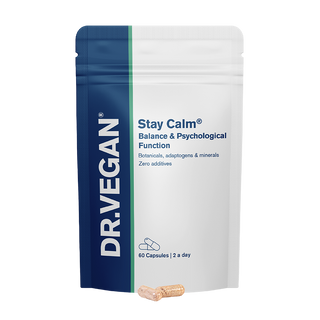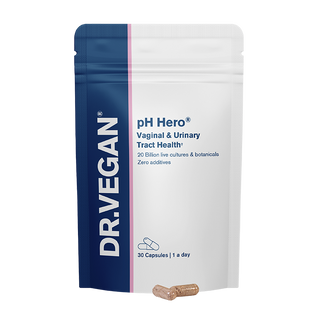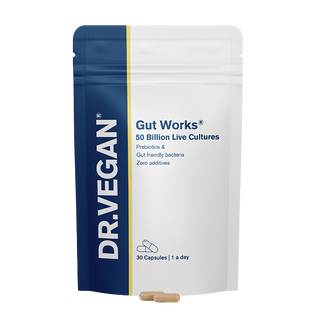Is vaginal eczema a thing?

What is vaginal eczema?
Vaginal eczema is a type of eczema that occurs specifically in the genital area. Eczema, in general, is a skin condition where patches of skin become inflamed, itchy, red, cracked and rough. When this affects the vaginal area, it can lead to intense itching, soreness and irritation.
Not sure what your diet is missing? Create your Diet Profile for free nutritionist advice.
Signs and causes
The signs of vaginal eczema are similar to those of eczema elsewhere on the body but are localised to the genital region. Common signs include:
- Itching: Persistent and intense itching is a hallmark of vaginal eczema.
- Redness: The skin around the vagina may appear red and inflamed.
- Dryness: The affected skin can become dry and may even crack.
- Discomfort: Itching and irritation can cause discomfort, especially during activities like urination or sexual intercourse.
The exact cause of vaginal eczema can vary. It is often associated with:
- Atopic dermatitis: Individuals with a history of eczema or atopic dermatitis are more prone to developing vaginal eczema.
- Contact dermatitis: Allergic reactions to certain products, including soaps, detergents, perfumes, or latex, can trigger eczema in the vaginal area.
- Hormonal changes: Fluctuations in hormone levels, including during pregnancy or menopause, can contribute to vaginal eczema.
- Stress: Emotional stress can exacerbate eczema signs. In our latest vaginal health survey of 1,202 women, we found that 23% of women reported stress as a significant factor in their vaginal health and in our gut health research of over 700 people, 66% said their gut health worsens when anxious. Creating a domino effect - stress can impact your gut health, which in turn can impact your vaginal health through the gut-vagina axis.*
Differentiation from other conditions
It’s essential to distinguish vaginal eczema from other conditions that affect the genital area, including vaginal dryness or vaginal infections:
Vaginal dryness
This is often due to hormonal changes, particularly during menopause and presents with signs like dryness and discomfort but usually lacks the intense itching and inflammation seen in eczema. Continue reading about vaginal dryness.
Vaginal infections
Yeast infections (like candidiasis) and bacterial vaginosis can cause itching and redness, but they typically come with discharge and distinct odours, unlike eczema. If you suspect vaginal eczema, consulting a healthcare professional for a proper diagnosis is crucial to receiving appropriate treatment. You may be interested in reading how to reduce UTIs next.
If you suspect vaginal eczema, consulting a healthcare professional for a proper diagnosis is crucial to receiving appropriate treatment.
Traditional treatments
Traditional treatment for vaginal eczema focuses on supporting signs and managing flare-ups. This may include:
- Topical Steroids: Prescription-strength corticosteroid creams or ointments can reduce irritation and itching.
- Emollients: Moisturising creams or ointments can help hydrate the skin and prevent dryness.
- Avoiding Triggers: Identifying and avoiding triggers such as allergens or irritants (e.g., certain soaps, perfumes, or fabrics) can prevent flare-ups.
- Hormonal Management: In cases where hormonal changes contribute to eczema, hormone therapy or other hormonal treatments may be recommended.
Natural methods of vaginal eczema management
- Stress Management: Techniques like mindfulness, yoga, or therapy can help manage stress, which may reduce the frequency and severity of flare-ups. Consider supplements like Stay Calm®, to help manage stress naturally.
- Natural Oils and Balms: Some natural oils, like calendula oil or chamomile oil, may have anti-inflammatory properties that can help calm irritated skin. Use these oils diluted with a carrier oil and apply gently to the affected area.
- Dietary Changes: Some individuals find that certain foods can trigger eczema flare-ups. Keeping a food diary and identifying potential triggers can help manage symptoms. Incorporate foods rich in omega 3 fatty acids (such as flaxseeds, walnuts and algae oil) and antioxidants (like fruits and vegetables) to support skin health. You may be interested in reading 'The role of nutrition in vaginal and bladder health'.
- Probiotics: Probiotics and fermented foods may help support gut health, which in turn can influence immune function and potentially reduce inflammation associated with eczema. Browse our Probiotics range including pH Hero®, an award-winning targeted formula to support vaginal health.
*This article contains data from UK surveys conducted by DR.VEGAN®. All survey findings reflect our own research efforts and have not been influenced or verified by any external organisations or third-party entities.
Vaginal eczema can be a challenging condition to manage due to its location and potential impact on intimate areas. Understanding its symptoms, triggers and treatment options is essential for effectively managing the condition and improving quality of life. If you suspect you have vaginal eczema, seeking guidance from a healthcare provider can provide clarity and ensure you receive appropriate care tailored to your needs. You may also find it beneficial to seek dietary advice from a registered Nutritional Therapy Practitioner who can guide you through healing your gut and skin and increasing your sense of wellbeing.
You may also enjoy reading:
- Period blood explained
- What is period poo?
- Understanding perimenopause periods
- The latest skin health research by DR.VEGAN®
- 5 Natural remedies to treat rosacea
- Understanding and managing Psoriasis
Want to hear more from our nutritionists? Sign up to our email newsletter for insights and exclusive offers:




















